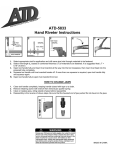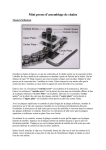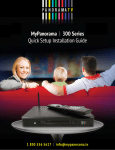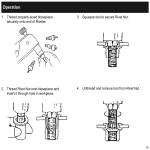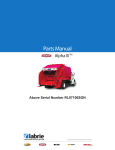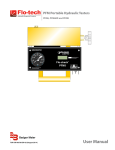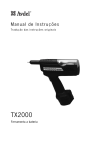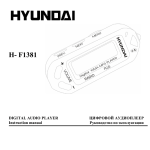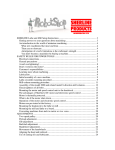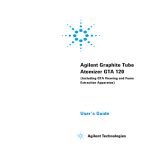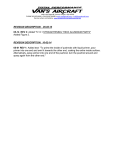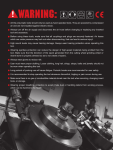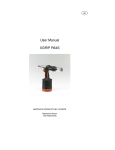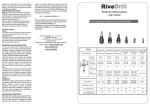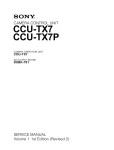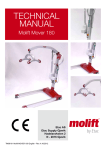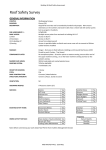Download d-9000-mil-2 operations manual
Transcript
1206 East MacArthur Street, Sonoma, CA 95476 Phone: (707) 935-1170 ● Fax: (707) 935-1828 Web: www.fsirivet.com ● Email: [email protected] D-9000-MIL-2 NSN: 5180-01-470-6539 Operations Manual D-9000-MIL-2 BLIND FASTENER INSTALLATION TOOL KIT (Kit contains 86 separate pieces inside its carrying case.) ® D-9000-MIL-2 BLIND FASTENER INSTALLATION TOOL KIT NSN 5180-01-470-6539 KIT CONTENTS QTY PART NUMBER DESCRIPTION 1 EA 1 EA 1 EA 1 EA 1 EA 2 EA 1 EA 1 EA 4 EA 1 EA 1 EA 1 EA 1 EA 1 EA 1 EA 1 EA 1 EA 1 EA 1 EA 1 EA 1 EA 1 EA 1 EA 1 EA 1 EA 1 EA 1 EA 1 EA 1 EA 1 EA 1 EA D-700-VM PT-100M PT-4000 D-28 F-4000A F-3001A F156 F159 F143 F142 F168 F169 F580 F396 F398 F155 F390 F391 F392 F393 F501 F502 F503 F505U F506 F360 F367 F361 F364 F372 F176 HAND HYDRAULIC RIVETER, PRESSURE VALVE AIR HYDRAULIC RIVETER CORDLESS RIVETER HAND RIVETER BATTERY CHARGER, SMART BATTERY PACK, Ni-MH (12v, 3.2AH) 3/32-1/8 NOSEPIECE 1/8 NOSEPIECE 1/8-3/16 NOSEPIECE 1/4 NOSEPIECE 3/16 MONOBOLT NOSEPIECE 1/4 MONOBOLT NOSEPIECE 3/16 MS NOSEPIECE 3/16 BULBTITE NOSEPIECE 1/4 BULBTITE NOSEPIECE 1/4 “T” RIVET NOSEPIECE 3/32 NAS 1400A NOSEPIECE 1/8 NAS 1400A NOSEPIECE 5/32 NAS 1400A NOSEPIECE 3/16 NAS 1400A NOSEPIECE 1/8 NAS 1900S NOSEPIECE 5/32 NAS 1900S NOSEPIECE 3/16 NAS 1900S NOSEPIECE 5/32 MS90353/54-S/U NOSEPIECE 3/16 MS90353/54-S/U NOSEPIECE 6-32 PULL-UP STUD NO. 6 ANVIL 8-32 PULL-UP STUD NO. 8 ANVIL 10-24 PULL-UP STUD NO. 10 TSN ANVIL SUPPLIER CAGE CODE: 64878 FASTENING SYSTEMS INTERNATIONAL, INC SONOMA, CA 95476 1 OF 2 PAGES PAGE 2 D-9000-MIL-2 KIT CONTENTS 1 EA 1 EA 1 EA 1 EA 1 EA 1 EA 1 EA 2 EA 1 EA 1 EA 1 EA 1 EA 1 EA 1 EA 1 EA 1 EA 1 EA 1 EA 1 EA 1 EA 1 EA 1 EA 1 EA 1 EA 1 EA 1 EA 1 EA 1 EA 1 EA 3 EA 1 EA 3 EA 3 EA 1 EA 1 EA 1 EA 1 EA 2 EA 1 EA 2 EA 1 EA 1 EA 1 EA 1 EA 1 EA 1 EA F362 F365 F373 F177 F363 F366 F374 F378 F377 F375 F379 F384 F365M F380 F366M F368 F378M F387 F379M F170-A F171 F187-3BCM F187-3ACM F187-1AR F687-1AF F687-2A F1074 F1075 F1076 F702 F128 F122-A F123 F123-A F123-B F758 F958 F990 F3245 F3081-A F101 F269C3 F609A F701-D9 F754-D9000 F755-D9000 SUPPLIER CAGE CODE: 64878 FASTENING SYSTEMS INTERNATIONAL, INC. 1206 EAST MACARTHUR STREET SONOMA, CA 95476-1372 10-32 PULL-UP STUD NO. 10 ANVIL 1/4-20 PULL-UP STUD NO. 1/4 TSN ANVIL 1/4-28 PULL-UP STUD NO. 1/4 ANVIL 5/16-18 PULL-UP STUD NO. 5/16 ANVIL 5/16-24 PULL-UP STUD 3/8-16 PULL-UP STUD 3/8 ANVIL 5 MM PULL-UP STUD 5 MM ANVIL 6 MM PULL-UP STUD 6 MM ANVIL 8 MM PULL-UP STUD 8 MM ANVIL 10 MM PULL-UP STUD 10 MM ANVIL MASTERSHAFT TURN NUT ADAPTER SHAFT, COMPENSATING ADAPTER SHAFT, THROUGH HOLE ADAPTER SLEEVE, ROTATING ADAPTER SLEEVE, FLATS ADAPTER SHAFT, MS STYLE EXT STR PULLING HD RIGHT ANGLE PULLING HD OFFSET PULLING HD SPARE PARTS CANISTER BLIND BOLT JAW HOLDER 2 PIECE CAST JAW SET 3 PIECE CAST JAW SET 3 PIECE JAW SET/ BB 5/32 3 PIECE JAW SET/ BB 3/16 JAW PUSHER BB, D-700 JAW PUSHER. PT-100 JAW PUSHER SPRING, PT-100 1/4 JAW FOLLOWER JAW PUSHER SPRING RIVET NUT STROKE GAGE RIVET GRIP GAGE METAL WEATHER TIGHT CASE CD-ROM, USER MANUAL OPERATING INSTRUCTIONS LAMINATED TOOL ASSY CARDS ATTENTION TECHNICIANS The D-9000-MIL-2 Blind Rivet Tool Kit is supplied with four riveters with 3/16” diameter nosepieces installed in their nose assemblies. The D-28 Hand Riveter comes with 2 piece jaws. All other riveters come with 3 piece jaws (F123) which permit installation of most all rivets from 1/8” thru 1/4” simply by changing the nosepiece, EXCEPT, in the case of the PT-4000 Cordless Riveter, which requires a larger jaw follower (P/N F3245) for 1/4” diameter rivets. Except for the D-28 Hand Riveter, which comes with 2 piece jaws, the riveters all will require the use of 2 piece jaws (F122-A) for 3/32” diameter rivet installation. The 2 piece jaws (F122-A) are furnished in the spare parts canister (F701). Common blind fasteners used throughout the U.S. military branches have been provided in a convenient chart form to help identify the proper nose assembly. For information on any other blind riveting applications for ground and aircraft/aerospace vehicles, please contact us at toll free 1-800-344-2393 or email us at [email protected]. USER GUIDE BLIND RIVET GRIP GAGE (F269C3) BLIND RIVET GRIP GAGE The Blind Rivet Grip Gage, F269C3, has been provided to permit the technician to properly select the rivet grip length required for the materials being joined. Blind rivets are normally specified by their diameter (in 1/32 “ increments) and their grip (in 1/16” increments); hence, a 3/16” diameter blind rivet with a 1/4 “ grip would have a suffix of -06-04 after the basic rivet manufacturer’s part number or military specification number (i.e. CR3213-06-04 nominal diameter CherryMax. The numbers are often abbreviated to -6-4). You will notice that the grip gage has several holes in it. They are to enable the rivet user to distinguish between the oversize (1/64”) and nominal diameter sizes. Once the sheets to be joined are brought tightly together a hole is then drilled and the grip gage can be inserted into the hole. The hook end of the gage should then catch on the back side of the hole and then the slide bar is brought down until it touches the top sheet. The gage can then be removed and the grip measured. Notice that the gage is scaled in 1/16” increments. Most commercial and aerospace blind rivets have at least a 1/16” grip range with the dash number signifying the maximum thickness or “grip range” that the rivet may be used in. If the measurement falls right on the line, then the user, in the case of aerospace quality blind rivets, can elect to use either the maximum grip of one rivet or the minimum grip of a longer rivet (i.e. a .250” reading would allow the use of either a -4 grip rivet in its maximum grip or a -5 grip rivet in its minimum grip). In normal circumstances users, if they have the option, will more likely select the rivet used in its maximum grip. This helps minimize blind side protrusion, and helps reduce unnecessary weight. Several thousand rivets can add up to many extra pounds of weight the plane will have to carry over its lifetime which of course translates into fuel consumption. CAUTION When gauging the material thickness it is always good to check at least two or more points around the hole. This helps reduce the chance that a burr on the blind side is inadvertently hooked that could give you a false reading. Of course any significant burrs or metal chips should be removed from between the sheets before measuring. F391 1/8 NAS1400A Nosepiece F502 5/32 NAS1900S Nosepiece F505U 5/32 MS90353/54 S/U Nosepiece F503 3/16 NAS1900S Nosepiece F155 1/4 T-Rivet Nosepiece F506 3/16 MS90353/54 S/U Nosepiece F398 1/4 Bulbtite Nosepiece F396 3/16 Bulbtite Nosepiece F169 1/4 Monobolt Nosepiece F168 3/16 Monobolt Nosepiece F501 1/8 NAS1900S Nosepiece F393 3/16 NAS1400A Nosepiece F392 5/32 NAS1400A Nosepiece F156 3/32-1/8 Nosepiece F142 1/4 Nosepiece F143 1/8-3/16 Nosepiece F390 3/32 NAS1400A Nosepiece F159 1/8 Nosepiece F580 3/16 MS Nosepiece D-9000-MIL-2 NOSEPIECE BAR F384 5mm Stud F365 Anvil F386 8mm Stud F378 Anvil F380 6mm Stud F366 Anvil F387 10mm Stud F379 Anvil F101 Stroke Gage F362 10-32 Stud F365 Anvil F363 1/4-28 Stud F366 Anvil F377 5/16-24 Stud F378 Anvil F374 5/16-18 Stud F378 Anvil F375 3/8-16 Stud F373 1/4-20 Stud F379 Anvil F177 Anvil F372 10-24 Stud F176 Anvil F360 6-32 Stud F367 Anvil F361 8-32 Stud F364 Anvil D-9000-MIL-2 Pull-up Studs/Anvils AR AR AR AR AR AR AR AR AR AR D-700C Standard Blind Riveting Set-Up F130-700C Nose Tube F122-A 2pc Jaws F126-F Jaw Holder F1381 Spring F700-041 Jaw Follower F188A Adapter Bushing CHART A D-700C Set-up for Blind Nut Installation F130-700C Nose Tube Anvil & Stud F171 Turn Nut F170-A Master Shaft F188A Adapter Bushing See Anvil & Studs Table for part numbers ATTENTION Female side of turn nut must face forward CHART B D-700C Standard Set-Up for NAS1400A F130-700C Nose Tube F122-A 2pc Jaws F126-F Jaw Holder F1381 Spring F700-041 Jaw Follower F393 3/16” F392 5/32” F391 1/8” F188A Adapter Bushing F390 3/32” CHART C D-700C Standard Set-Up for MS90353/54 S&U & Washer Anvil Driven, Single Action Only F505U = 5/32” F506 = 3/16” F130-700C Nose Tube F128 Jaw Holder F700-041 Jaw Follower F123-A = 5/32BB Jaws F123-B = 3/16BB Jaws F3181 Spring & F188A Adapter Bushing CHART D D-700C Standard Set-Up for NAS1900S Type, Single Action F130-700C Nose Tube F122-A 2pc Jaws F126-F Jaw Holder F503 3/16” F1381 Spring F700-041 Jaw Follower F502 5/32” F188A Adapter Bushing F501 1/8” CHART E D-700C Set-up for CherryMax® & Huck-Clinch (NAS9300/M7885 Pulling Heads F187-1AR Adapter Sleeve & F187-2A Puller Shaft F1076 Offset Pulling Head F1075 Right Angle Pulling Head F1074 Extended Straight Pulling Head CHART F D-700C Set-up for MS & NAS1400A Pulling Heads F687-1AR Adapter Sleeve & F687-2A Puller Shaft RV872 Offset Pulling Head F1060 Side-Ejection Straight Pulling Head RV882 Series Right Angle Pulling Head CHART G D-700C Set-up for Using the Stroke Gage PT-4000 Operating Instructions MKT-04 1/08 PT-4000 Rivet Capacity The PT-4000 pulls most all pull style blind rivets including CherryMax and Cherry “A” Max thru 1/4” diameter in all materials and Blind Bolts and Maxibolts thru 3/16” diameter. Equipment/Accessories Nosepieces: 3/32 thru 1/4 Wrench: SW 12 (covers nosepiece compartment Suspension Loop: Flips open from housing Battery: Quick Charge/ 12 Volt DC Technical Data Weight: 4.85 lbs (with battery) Stroke: 787” Drive Unit: 12 V direct current motor Traction Power: 3,000 lbs. Nosepiece Table: Rivets Per Battery Charge Rivet Dia. Rivet Body Material *Rivets Per Charge Nosepiece Part No. 3/32” Aluminum 1,900 F140 1/8” Aluminum 1,300 F159 1/8” Steel 1,100 F159 1/8” Stainless Steel 1,000 F159 1,000 F143 5/32” Steel 900 F143 5/32” Stainless Steel 800 F143 3/16” Aluminum 700 F143 3/16” Steel 500 F143 3/16” Stainless Steel 400 F143 1/4” Stainless Steel 90 F142 5/32” Aluminum * Rivets per battery charge based on Mil-R-24243 style blind rivets in maximum grip condition Starting Procedure Install fully charged battery into housing. Select proper nosepiece (see page 2) and screw into head. Attention: Do not cover or stick anything into the vent holes. Operating Procedure Pushing the trigger starts the operation. When releasing the trigger, the jaw mechanism returns to the start position automatically. Eject the spent mandrel into the mandrel container by tilting the tool backward, or through the nosepiece by tilting tool forward. The riveting tool is equipped with overload protection. In case if an overload, the operation will be stopped and the red light goes on. If that happens, release the trigger and the mechanism will return to the start position. The battery will deliver uniform power for tool operation until depleted to the last 2-3 rivets of charge capacity. It is designed to have the jaw mechanism return to the starting position when the trigger has been released. Maintenance The maintenance of the riveting tool is limited to the complete jaw mechanism and the included wearing parts. Remove the battery (#40) from the tool housing. Unscrew the head (#13) from the tool and clean it. Unscrew the jaw housing (#12) from the coupler. Take out the jaws (#11), clean and lubricate or replace if worn. Reassemble in reverse order and make sure that all parts are tightened! Warranty There is a 6 month warranty from the day of delivery on the PT-4000. Damages caused by common wearing, overloading or improper usage or handling are excluded from the warranty. Damages caused by material or manufacturing faults will be covered by this warranty and will be repaired or replaced at no cost. Claims can only be accepted if the complete riveting tool, fully assembled, is returned to the distributor or FSI. Battery / Charger Technical Data Charger Battery Input Voltage: 110 V/60 Hz Rated Voltage: 12 VDC Output Voltage: 12 VDC Number of Cells: 10 Pieces Recharge Time: Approx. 1 hour Cell Construction: Nicad with Weights: 2.6 lbs. Overcharge protection Capacity: 1.4 amp hour Weight: 1.4 lbs Recharging Procedure Take charger out of steel case and connect to power line. Make sure the voltage is in accordance with the label! The battery must be installed correctly (positive pole to positive pole) with minimal force into the charger. The quick recharging procedure is automatically started and indicated by red light. After approximately 1 hour the charging procedure is finished and the charger switches to trickle charge, indicate by a green light. Place only cool batteries into the charger in order to obtain a full battery recharge. Battery Handling The battery is rechargeable up to 1000 times and reaches its full power only after several rechargings. Do not discharge the battery completely. Recharge is not used for an extended period. Substantially reduced operating time of battery after a proper recharge indicates the battery must be replaced. Keep battery in a cool and dry place, with temperature not to exceed (122 F). Environmental Protection If batteries have to be replaced, the following instructions should be followed: Return used batteries to your supplier or FSI for recycling. Under no circumstances should nickel-cadmium batteries be discarded as normal waste which might be burned or exposed to ground water. Trouble Shooting Blind Rivet Cannot be Set Causes Remedy Depleted battery charge Recharge, if necessary replace Jaws dirty or worn Clean and lubricate or replace Jaw pusher spring weak Tighten When trigger is pressed, no function Replace (red indicator light shows) No Spent Mandrel Discharge Causes Remedy Wrong nosepiece Exchange according to page 2 Nosepiece worn Replace Mandrel jammed in jaws Loosen the mandrel, clean and lubricate the jaws or replace Head Dirty inside Clean Spent mandrel container filled Remove and empty Passage clogged Remove clogged mandrels and check for free ejection Red Light Indicated Faults A) When trigger is pressed Causes Remedy Overheating of electronic control Allow too to cool to ambient temperature B) While pulling the rivet Causes Remedy Overloading Check working capacity Overheating of electronic control Allow tool to cool to ambient temperature Depleted battery charge Recharge or replace C) After releasing the trigger Causes Remedy Jaw mechanism is not reaching the front Tighten jaw mechanism position Maintenance Instructions General Notes Warranty repairs are carried out by the manufacturer only. Repairs outside the warranty period should only be carried out by trained personnel. The following instructions must be strictly adhered to, as assembly or adjustment errors may cause major damage to the PT-4000. Repair Tools & Lubricant For repair of the PT-4000, the following should be available: Screw Driver Torx T 20 Hexagonal Wrench SW 2.5 mm Open End Wrench 27 mm Open End Wrench 17 mm Open End Wrench 14 mm Lubricating Grease (#46) Dismantling the PT-4000 Remove battery (#40) from the tool. Unscrew spent mandrel container (#39). Remove housing screw (3 pcs. #32 & 5 pcs. of #33) with screw driver Torx T 20. Take off hand guard (#31). Take off top of tool housing (#1) and pull off the red and blue connecting wires from the electronic control (#26). Unscrew electronic control (#26) using screw driver Torx T 20. Unscrew magnet holder (#27) using the hexagonal wrench SW 2.5mm. Take out electronic control (#26) and magnet holder (#27). Take out motor (#25). ATTENTION: Reassembly Tip: Note how connecting wires to the motor are laid out in the tool housing! Take out drive system (#42). Unscrew head (#13) using open end wrench SW 27mm. Unscrew jaw housing (#12) using open end wrench SW 17mm and take out jaws (#11), jaw pusher (#10) and jaw pusher spring (#9). Unscrew jaw housing coupler (#7) with scraper ring (#8) using open end wrench SW 14mm. Remove screws (4 of #6) using hexagonal wrench SW 2.5mm. Pull off drive bearing (#3) and pinion shaft (#4) with snap ring (#6) and bushing (#20). Assembly & Stroke Adjustment Assembly of Drive System (#42) Slip drive bearing (#3) over ball screw drive (#2) and put pinion shaft (#4) together with snap ring (#5) in bearing place. Attention: Before screwing ball screw drive (#2) and drive bearing (#3) together, make sure the locating marking “B” of the bearing disk inside the ball screw drive (#2) is placed opposite the pinion shaft (#4). See Parts Drawing. Assemble this entire unit together with the 4 screws (#6) using hexagonal wrench SW 2.5mm. Screw jaw housing coupler (#7) with scraper ring (#8) onto ball screw using open end wrench SW 14mm. Put jaw pusher spring (#9) and jaw pusher (#10) onto jaw housing coupler (#7). Place the jaws (#11) in jaw housing (#12) and screw this onto jaw housing coupler (#7) using open end wrench SW 17mm. Screw head (#13) on using open end wrench SW 27mm. Assembly of the PT-4000 The sub-assemblies and other parts should be put into tool housing half (#1) containing the nosepiece bracket as follows: To install drive system (#42), slip the bushing (#20) onto the shorter end of the pinion shaft (#4) while ensuring that the snap ring (#5) in pressed to the gear. To insert the tube (#22), the longer end of the tube must be inserted into the ball screw, while the collar of the tube must be inserted into the provided recess of the tool housing. To place the motor connecting wire, the red wire should be bent downwards at the soldering tag towards the blue wire, then bent again to be parallel with the blue wire. To install motor (#25), the two connecting wires are to be places side by aide around the first guiding stud of the tool housing and behind the middle guiding studs. The wires should then be brought up in front of the third guiding stud. The electronic control unit (#26) should be installed by putting it on the stud inside the tool housing and then fastened with the housing screw (#32). Click magnet holder (#27) in the guiding slot of the electronic control (#26). Fasten other end of magnet holder (#27) to ball screw drive (#2) with magnet holder screws (#28) together with two spring lock washers (#29) using the hexagonal screw drive SW 2.5. For later stroke adjustment, do not tighten the screws. Plug the two blue connecting wires of motor (#25) and electronic control until (#26) together. DO NOT CONNECT RED WIRE YET!! Stroke Adjustment Turn gear of pinion shaft until distance “A” measures 0.118” -See Parts Drawing. Then insert battery (#40) correctly in tool housing. Attention: Positive pole of battery (#40) must be at top to avoid damage of electronic control unit (#26). While trigger is pressed, magnet holder (#27) must be adjusted in slot of electronic control until red indicator light goes on. After releasing trigger, the two magnet holder screws (#28) must be tightened. NOW connect red wire to electronic control (#26). Attention: Both connecting wires must be places around guiding stud on electronic control (#26) in such a way to keep slot free for movement of magnet holder (#27). Preliminary Motor Test: Motor (#25) is be carefully held down at both ends. Make sure to allow room for magnet holder to move back and forth. Pull trigger to move jaw mechanism about .200 to .400 inches, and release trigger. Check distance “A” (See Parts Drawing). It must be 0.039” - 0.051” If distance “A” gap is below 0.039”, magnet holder (#27) should be moved carefully to the right after loosening the to screws (#28) in order to obtain .039 to .051 gap. If distance “A” gap is larger that 0.051”, magnet holder must be moved to the left accordingly. After tightening the screws (#28), repeat test and recheck distance “A”. Take battery (#40) out of toll housing. Finishing Lubricate gear teeth with lubricating grease (#46). Insert suspension loop (#30). Insert hand guard (#31). Replace second half of tool housing. Tighten both halves of tool housing (#1) together with the five housing screws (#33) and the three housing screws (#32) using screw driver Torx T 20. Safety Notes The PT-4000 has been designed and manufactured in accordance with the applicable safety regulations. If the PT-4000 is being used for the intended purpose in accordance with instructions and normal safety measures, there is no danger involved during operation. WARNING! Never operate the PT-4000 without placing the blind rivet in proper hole of the work piece or material. The rivet could be propelled from the tool. Avoid pointing the tool at anyone during operation. The spent mandrel container (#39) must always be firmly screwed into place on the tool during operation. Do not plug or cover vent holes in tool housing an any time. Repairs should be carried out by trained personnel only. Otherwise, return PT-4000 to supplier or to FSI. Do not operate the PT-4000 and the Battery Charger in an environment allowing exposure to moisture, combustible fluids or gases. Safety Notes: (continued) Avoid damage to cord and plug of charger. Inspect regularly for any damage. Ensure that the battery is properly secured in the tool housing. Take the charger out of steel case when recharging the battery. Place the battery in the correct position (+pole to +pole) and do not force it into the charger. Always remove the battery before servicing / repairing the PT-4000. Do not discard batteries into water or fire as danger of explosion exists. Any used battery be disposed of in accordance with environmental regulations. Do not use the PT-4000 for any function other than riveting, especially not as a hammer. Safety Precautions PT-4000 CORDLESS BLIND RIVETER The PT-4000 Blind Riveter has been designed with safety in mind and it conforms to all applicable regulations governing cordless battery operated tooling. If utilized in accordance with operating instructions, danger free application of the tool is assured. CAUTION: Do not rivet without the rivet being installed into material. The rivet body and a portion of the mandrel can shoot away from the tool which could cause injury. Stem canister (Item #39) should always be mounted on the tool to catch spent stems. The ventilation holes to the electric motor must not be obstructed. Do not cover or place anything over them. Repairs should only be undertaken by skilled and trained repair technicians. If unsure, send the tool back to your dealer or the factory. The PT-4000 and the battery charger unit must be kept away from moist / wet surroundings and away from flammable liquids and gases. Do not use in temperatures above 120 degrees F. Socket, Plug and Charger unit should be routinely inspected, and if damaged, replaced or repaired. To charge batteries, remove charger from steel case. The battery pack will only fit into charger socket in proper orientation and is installable with a minimum amount of insertion pressure. When working on the PT-4000 (i.e., replacing jaws, jaw follower or spring) be sure the battery pack is removed from the riveter. Do not throw battery pack into water or fire as they can explode. The battery pack should be recycled according to instruction manual. Item Part No. 1 F3014 2 Description Item Part No. Tool Housing, complete 22 F3761 Spent mandrel tube F3189 Ball screw drive, assembled 25 F3103 Motor, complete 3 F3185 Drive bearing, complete 26 F3850 Electronic control 4 F3193 Power transfer gear 27 F3266 Magnet holder, complete 5 F3753 Snap ring 28 F3990 Magnet holder screw 6 F3932 Screw 29 F3008 Spring lock washer 7 F3605 Draw Bolt 30 F3559 Suspension loop 8 F3745 Scraper ring 31 F3540 Hand guard 9* F3081 Jaw pusher spring 32 F3032 Housing screw 10* F3245 Jaw pusher, 1/4” 33 F3024 Housing screw, short 11* F123 Jaws (3 pc) 35 F3030 Nosepiece bracket 12 F3126 Jaw housing 36 F3091 Nosepiece holder 13 F3130 Nosetube 37 F3834 Nosepiece wrench 14 F505 Nosepiece, 5/32” Blind Bolt 39 F3282 Spent mandrel container 15 F506 Nosepiece, 3/16” Blind Bolt 40 F-3001 Battery 16 F505-MB Nosepiece, 5/32” Maxibolt 41 F3555 Lubricating grease 17 F506-MB Nosepiece, 3/16” Maxibolt 42 F3197 Drive system (pos. 2-13,15) F142 1/4” Nosepiece 18 F169 Nosepiece, 1/4” Monobolt 43 19 F143 Nosepiece, 3/16 CherryMax 45 20 F3893 Bushing Description F-4000A Battery Charger * Wearing Parts PT-4000 (optional) Configurations F130-F Nose Tube Standard Configuration F3621 Jaw Follower F3605 Draw Bolt Nosepiece F126-F Jaw Holder CherryMax® Pulling Head Configuration Extended Straight Pulling Head F1074 F3093 F3081 Spring Spring F123 3 pc Jaws F187-1AF Sleeve Right Angle Pulling Head F1075 F187-3BCM Adjustable Adapter Shaft Offset Pulling Head F1076 CherryMax® & Pop® Rivets Configuration *Note: Replace Jaw Follower F3621 with F3245 (see spare parts canister) when installing 1/4” dia. rivets. You may also use the F123 (3pc) jaws for 1/8” thru 1/4” diameter blind rivets. *F3245 Jaw Follower Rivet Types: * F122-A 2 pc Jaws F3081 Spring 1/4” Rivets F123-A or F123-B BB Jaws MS90353/54 “U” & “S” Type Blind Bolt Configuration F3081 Spring Nosepiece F130-F Nose Tube F128 BB Jaw Holder F3245 Jaw Follower Aerospace and Industrial Sheet Metal ●Applications● Types of rivets installable with the PT-4000 include, but are not limited to, virtually all CherryMax® (M7885), Avdel®, or Cherry Monobolts®, Cherry Interlock®, Huck MagnaLok®, and Pop type rivets. The PT-4000 is also capable of installing both 5/32” and 3/16” Blind Bolts (MS90353/54-S/U) with the proper nosepieces (provided in the Mil-1 and MIL-2 kits). Pulling Head Assembly Right Angle Pulling Head (F1075): Thread the internal threads of the pulling head’s draw bolt two or three turns onto the adapter puller shaft. Next, engage the threads of the pulling head housing and continue threading into place. To minimize stroke requirement and to set a particular rivet size, simply adjust the nose tube of the right angle head by loosening the jam nut at its base. Extended Straight (F1074): Thread the extended straight pulling head’s haw holder assembly onto the adapter puller shaft assembly. (Tighten by putting rivet stem into adapter puller shaft hole to keep it from rotating.) Next, take the straight pulling head’s jam nut and back it off at least ten full turns from the end. Now thread the adapter sleeve into place, approximately six full turns. Use the red marker on the jam nut to aid in counting. Next, engage battery pack into tool and fully retract the draw bolt / haw holder assembly. While keeping the jaw holder fully retracted, insert desired rivet stem into nosepiece (to set up for use with all sizes 3/16 oversize). Now allow the jaw holder assembly to come forward. If it easily accommodates the stem (ie, you can move it in and out freely), you can now tighten the jam nut into place. If, however, it does not readily accept or release the stem freely, begin turning the outer sleeve clockwise in quarter turn increments until a proper setting is reached. Offset Pulling Head (F1076): Thread the internal threads of the offset pulling head’s draw bolt onto the male thread of the adapter puller shaft. Take two or three turns before engaging the male threads of the pulling head housing. How thread both into place until there is no gap between the housing and the draw bolt. Now tighten jam nut. CAUTION: If you tighten the outer sleeve too far down, it will restrict the return of the draw bolt, thereby causing an overload condition on the tool. The red indicator light will come on. Remove the battery immediately, loosen outer sleeve, and restart assembly procedure. Failure to relieve For Blind Bolt and Maxibolt Conversion When pulling Blind Bolts and Maxibolts you will need to use the following items: For 5/32 or 3/16 Blind Bolts and Maxibolts: Remove Nose Tube (F130-F). Thread off Jaw Holder (F126-F) and Jaws (F122-A) and set aside. Be careful not to allow the spring and jaw follower to come out of the tool. Next, you will need the Blind Bolt Jaw Holder (F128). Insert Jaw Set (F123-A) 5/32 size into holder, keep rubber O-Ring securely around the three piece jaws. This is important because you must keep the jaws aligned at all times while pulling Blind Bolts or Maxibolts to prevent the stem from jamming and cracking the jaws. Thread Jaw Holder (F128) onto the Draw Bolt (F3605) and thread nose tube back onto the tool. Then use the 5/32 Maxibolt Nosepiece (F505-MB) for S-Type Blind Bolts or the 5/32 Blind Bolt Nosepiece (F505) for the U-Type Blind Bolts. Reverse the process to assemble tool for regular CherryMax riveting. For 3/16 Blind Bolts and Maxibolts: Remove Nose Tube (F130-F). Thread off Jaw Holder (F126-F) and Jaws (F122-A) and asset aside. Be careful not to allow the spring and jaw follower to come out of the tool. Next, you will need the Blind Bolt Jaw Holder (F128). Insert Jaw Set (F123-B) 3/16 size into holder, keep rubber O-Ring securely around three piece jaws. This is important because you must keep the jaws aligned at all times while pulling Blind Bolts or Maxibolts to prevent the stem from jamming and cracking the jaws. Thread Jaw Holder (F128) onto the Draw Bolt (3605) and thread nose tube back onto the tool. Then use the 5/32 Maxibolt nosepiece (F506-MB) for S-Type Blind Bolts or the 5/32 Blind Bolt Nosepiece (F506) for the U-Type Blind Bolts. Reverse the process to assemble the tool for regular CherryMax riveting. PT-100 / PT-100M Riveter Operating Instructions MKT-02 PT-100 SERIES RIVETER NSN 5130-01-397-6805 ASSEMBLY DIAGRAM/OPERATING INSTRUCTIONS Puller Shaft Sleeve Spring F124-A Two Piece Jaws Nose Tube F130 Nosepiece Jaw Holder F126 Reservoir Shield Actuating Trigger Releasing Trigger Adapter Shaft F187-2A Adapter Sleeve F187-1A CAUTION: The PT-100 operates off 90 to 120 PSIG dry, compressed air. Do not oil. Higher pressure may damage the riveter. Assembly Procedures: 1. Place the Two Piece Jaws (F122-A) inside the Jaw Holder (F126). 2. Place the assembled item into one end of Sleeve Spring (F124-A). The flange on the Jaw Holder should bottom out on the Sleeve Spring. These two items fit together firmly, thus some pressure may be required. 3. Next, point the tool downward, and place the open end of the Sleeve Spring (F124-A) over the Puller Shaft and thread the Jaw Holder onto the Puller Shaft until it bottoms out against Puller Shaft flange. (WARNING: FAILURE TO BOTTOM OUT AGAINST THE FLANGE MAY DAMAGE THREAD AND/OR CAUSE RIVETS TO JAM). 4. Place the Nose Tube (F130) over the complete assembly and hand tighten. Threads on the outer sleeve should disappear and the Reservoir Shield should be stationary. 5. Now select the proper nosepieces for the diameter and type of rivet being used and thread into the end of the Nose Tube until it bottoms out. It may be necessary to extend the nose tube by actuating the trigger (see operating instructions) in order to thread the nosepiece completely into place. CAUTION: Nosepieces can loosen with use and may cause damage to the threads if not kept tight. Check periodically, and if no other nosepieces are going to be needed for the day, tighten with a wrench. PT-100 SERIES OPERATING INSTRUCTIONS Actuating Trigger Releasing Trigger 1. Connect PT-100 riveter to air source. Be sure to utilize clean, dry compressed air over a 90 to 120 PSIG range. If using a multi-plane swivel be sure swivel is properly tightened into tool before installing air fitting into swivel. 2. Select the proper nosepiece for installing the blind rivet being used and hand tighten it into the nose tube. If frequent changing of the nosepiece is not required, slight tightening with a wrench is recommended in order to prevent the nosepiece from backing out during riveting operation. If rivet nosepiece will not easily install into nose tube simply actuate the Actuating Trigger and cause the nose tube to move forward thus allowing ease of nosepiece installation. 3. Insert rivet into nosepiece being sure that the riveter is in the fully retracted position. (If nose tube is partially extended, simply depress Releasing Trigger until the nose tube fully retracts to starting position.) Place rivet into properly prepared hole and hold riveter against materials being riveted using firm, steady pressure. Be sure to keep riveter as perpendicular to work surface as possible (within +/- 1.5 degrees from centerline). Next, depress Actuating Trigger being careful not to depress the Releasing Trigger at the same time. If you do, the tool will not actuate and the hydraulic fluid (no. 10 machine oil) will just circulate through the by-pass valve. The riveter has a maximum stroke of .625” and will set most blind fasteners in one stroke; however, if the tool reaches the end of its stroke before setting a fastener: DO NOT CONTINUE TO DEPRESS THE ACTUATING TRIGGER. Release the Actuating Trigger and depress the Releasing Trigger. The riveter will then retract and you can re-grip the fastener and reactivate the tool until you upset the fastener. 4. After the rivet stem breaks you may depress the Releasing Trigger, point the tool downward and the broken rivet stem will drop out of the nosepiece. NOTE: If the rivet stem sticks in the nosepiece after the rivet is set, lightly tap the end of the rivet stem on a hard surface while holding the Releasing Trigger in the full depressed position. This should then free the jaws and permit the tool to release the rivet stem. If the rivet stem continues to bind or hang up in the nose assembly check the jaw holder by removing the nose tube to see if it is properly tightened into place. If loose, tighten and reassemble after checking the jaws to see that they are not severely worn. Replace if necessary. NOTE OF CAUTION: If you cause the riveter to reach its maximum stroke you may cause the riveter to go into a by pass mode which causes a pressure relief valve to open (this occurs when approximately 4,400 lbs. of pulling force is reached). This condition will often cause the normal hand releasing pressure required to return the tool to its normal position to increase. Simply increase pressure on the releasing trigger and the tool will release. F187 ADAPTER FOR SPECIAL PULLING HEADS INSTRUCTIONS: 1. Place the Adapter Shaft (F187-2A) into end of the Sleeve Spring (F124-A) 2. Place other end of the Sleeve Spring (F124-A) over the Puller Shaft and thread the Adapter Shaft (F187-2A) onto the Puller Shaft hand tight against it so no threads are showing. 3. Place the Adapter Sleeve (F187-1A) over assembly and hand tighten until threads disappear. Reverse for disassembly. ASSEMBLY IS NOW READY FOR ANY OF THE SPECIAL PULLING HEADS. Adapter Shaft F187-2A Adapter Sleeve F187-1A Sleeve Spring F124-A Actuating Trigger Right Angle Pulling Head F1075 Collet Assembly 729A25/701B29A Offset Pulling Head F1076 RIGHT ANGLE PULLING HEAD ASSEMBLY INSTRUCTIONS: Extended Straight Pulling Head F1074 1. Thread interior draw bolt of the Right Angle Pulling Head (F1075) onto the Adapter Shaft (F187-2A) 3 turns. 2. Push the Right Angle Pulling Head (F1075) into the Adapter Sleeve (F187-1A) and mate thread. Thread at least 5 full turns until rivet stem fits easily into nose piece (Adjust nose piece in for larger diameters. 3. Position head direction and set jamb nut. Reverse for disassembly. 4. Depress Actuating Trigger to install rivet (see operating instructions). OFFSET PULLING HEAD ASSEMBLY INSTRUCTIONS: 1. Open Offset Pulling Head (F1076) 1/4” as shown. 2. Thread interior draw bolt of the Offset Pulling Head (F1076) onto the Adapter Shaft (F187-2A) 4 turns. 3. Push the Offset Pulling Head (F1076) into the Adapter Sleeve (F187-1A) and mate threads. Thread in until 1/4” head gap is fully closed. DON’T GO BEYOND! 4. Position head direction COUNTERCLOCKWISE ONLY. Set jamb nut. 5. Depress Actuating Trigger to install rivet. Rivet stems will push out the back. Reverse for disassembly. EXTENDED STRAIGHT PULLING HEAD ASSEMBLY INSTRUCTIONS: 1. Thread the Collet Assembly (749A25/701B29A) onto the Adapter Shaft (F187-2A) 2. Slide the Pulling Head Sleeve (F1074) over the Collet Assembly (749A25/701B29A) and into the Adapter Sleeve (F187-1A) and mate threads. Thread on and bottom out against assembly. DON’T GO BEYOND! 3. Set jamb nut. Reverse for disassembly. 4. Rivet may be forced in to open jaws initially. 5. Depress Actuating Trigger to install rivet. ASSEMBLY DIAGRAM FOR OLYMPIC-LOK PULLING HEADS - The Olympic-Lok (NAS1400 ‘A’ Code) and the Cherry-Lok use the same non-shift tooling system - One pulling head installs both flush and protruding head rivets in all grips - No tool adjustment required with this system F687 ADAPTER FOR SPECIAL PULLING HEADS– INSTRUCTIONS 1. Place the Adapter Shaft (F687-2A) into the end of the Sleeve Spring (F124-A). 2. Place other end of the Sleeve Spring (F124-A) over the Puller Shaft and thread the Adapter Shaft(F687-2A) onto the Puller Shaft hand tight against it. 3. Place the Adapter Sleeve (F687-1A) over assembly and hand tighten (threads should disappear). Reverse for disassembly. ASSEMBLY IS NOW READY FOR ANY OF THE SPECIAL PULLING HEADS. Adapter Shaft F687-2A Sleeve Spring F124-A Adapter Sleeve F687-1A Puller Shaft Offset Pulling Head RV872 or RV8872 Straight Extension Pulling Head RV812 OFFSET PULLING HEAD ASSEMBLY INSTRUCTIONS: 1. Thread interior draw bolt of RV872 or RV8872 onto the Adapter Shaft (F687-2A) approx. 4 turns. 2. Push RV872 or RV8872 into the Adapter Sleeve (F687-1A) and mate threads. Thread in until head gap is fully closed. DON’T GO BEYOND! 3. Position head direction counterclockwise only. Set jamb nut. 4. Depress Actuating Trigger to install rivet. Rivet stem will push out the back. (see operating instructions) Reverse for disassembly. STRAIGHT EXTENSION PULLING HEAD ASSEMBLY INSTRUCTIONS: 1. Thread RV812 onto the Adapter Shaft (F687-2A). 2. Thread the sleeve of the RV812 over assembly and into the Adapter Sleeve (F687-1A). Thread on and bottom out against assembly. DON’T GO BEYOND! 3. Set jamb nut. Reverse for disassembly. 4. Rivet may be forced in to open jaws initially. 5. Depress Actuating Trigger to install rivet. OPERATING INSTRUCTIONS D-700C Hand-Powered Riveter PATENT PENDING 1206 E. MacArthur Street Sonoma, CA 95476 USA Tel: 1-707-935-1170 Fax: 1-707-935-1828 www.fsirivet.com TABLE OF CONTENTS Description ..............................................................................................................................................................3 Fluid Used, - type, safety ........................................................................................................................................3 Safety Warnings ................................................................................................................... 4 Ergonomic and Operational Adjustments ..............................................................................................................4 Lever Span Adjustment ...............................................................................................................................4 Load ..............................................................................................................................................................4 Tool Operation, Recommended Pulling Heads .....................................................................................................4 Troubleshooting Guide ..................................................................................................................................... 5 Maintenance and Repair ................................................................................................................................. 5 Service ....................................................................................................................................................................5 Hydraulic pump service .......................................................................................................................... 6 Pressure relief valve service .................................................................................................................. 6 Piston and adaptor ........................................................................................................... ...................... 6 Final assembly ............................................................................................................... ........................ 6 Fill and Bleed Instructions ..................................................................................................................... 6 Checking fluid level ......................................................................................................... ....................... 7 Replenishing fluid .......................................................................................................... ........................ 7 Parts List .................................................................................................................... ...................................... 7 Exploded View ........................................................................................................................................................8 Contact / Warranty Information ........................................................................................................BACK COVER DESCRIPTION D-700C is a lightweight ergonomic hand powered riveter providing means to install a wide variety of blind type fasteners in the absence of other power sources (compressed air or electricity). It combines the safe and smooth operation of well-known pneumatic hydraulic riveters with the latest research in automatic systems. It features an “intelligent” power optimization system that provides high installation loads at low hand effort. Its durable, all metal design makes this powerful and robust tool ideal for use in rugged repair facilities and field repair. D-700C features a high strength steel mounting system compatible with the previous D-700A and D-100. SPECIFICATIONS Fastening Systems International, Inc policy is one of continuous development. Specifications shown in this document may be subject to change which may be introduced after publication. For the latest information always consult FSI. STROKE PULLING CAPABILITY POWER SOURCE HAND EFFORT (Lbs) 0.750" Above 5000 Lbs-F Hand Pump 30 @ 3000 Lbs. WEIGHT (INCLUDING PULLING HEAD) 1.96 Lbs. SAFETY WARNINGS • Do not operate the tool when it is directed at any person and do not pull rivets in the air. • Do not pump beyond your hand strength capability; use of two hands to complete an installation is OK • Do not exceed a maximum output load adjustment of 5500 Lbs; • Do not throw, drop or use the tool as a hammer. • Do not use the tool beyond its design intent. • Consult the tool manual before disassembly, troubleshooting or repair. It is advised that major repairs be undertaken by personnel trained by Fastening Systems Int’l, Inc. (FSI); contact us with your training requirement. • Wear appropriate personal protection equipment when operating, repairing, or overhauling this tool. • Never use Loctite® when mounting offset or right angle pulling heads. • No component substitutions are authorized; any modification to the tool, pulling heads, accessories or FSI supplied components shall be at the customer’s entire responsibility. FSI will be pleased to advise on any proposed modification. • The tool must be maintained in a safe working condition at all times and examined at regular intervals. • For maintenance, place the tool in an oil pan; dispose of used fluid properly. • Avoid excessive skin contact with the fluid. Wash thoroughly after handling the fluid. ERGONOMIC ADJUSTMENTS For item and part numbers, refer to the component list and exploded views on page 8. Lever Span Tools necessary: 5/32” hex wrench Adjust how far the pump lever extends from the handle for a comfortable operation; thread set screw 42 in to bring the lever closer, thread-out to increase lever distance- see picture below. Maximum output load Tools necessary: 5/32” wrench This is a maximum output load adjustment; if you need a more precise adjustment contact FSI. • Thread-out the adjustment screw (33) to lower the load, thread-in to increase it; Cautions: Do not thread out beyond flush with the pressure relief body (36) – see picture below. • Do not exceed a maximum output load adjustment of 5500 Lbs; LEVER ADJUSTMENT Use a 5/32 hex wrench LOAD ADJUSTMENT Use a 5/32 hex wrench 3 TOOL OPERATION Prior to using the hand riveter, make sure that: • The piston is fully returned forward by depressing the side pressure relief button (48) • The hand lever is properly adjusted for comfortable operation • The correct pulling head is properly mounted; see pulling head documentation for additional instructions Fastener Installation • Insert the blind fastener into the structure and place the riveter onto the rivet stem. • Hand pump to complete installation; after each pump allow the lever to fully return to its original position. Short stroking is not recommended as it will increase the number of pumps. • Depress the pressure relief button and allow the broken stem to eject through the front RECOMMENDED PULLING HEADS • Contact FSI at 1-800-344-2393 or 707-935-1170 or by e-mail at [email protected] for recommendations. TROUBLESHOOTING GUIDE For item and part numbers, refer to the component list and exploded view on page 8. The stem of the fastener to be installed won’t fit; • Make sure the correct pulling head is used, and that it is properly adjusted (the jaws should free the broken stem when the side button is depressed) • Check for jammed stems inside the jaws; press the side button to properly eject the stem The stems will not break to complete the installation • Check the jaws- replace or clean them as necessary. • Make sure that the proper pulling head and optional components are used • Check the fluid level; replenish if low. Nothing happens when I pump • Check the fluid level –add fluid as needed • Re-adjust to increase output load • Service or replace the pressure relief valve • Disassemble and clean thoroughly the internal components; debris or contamination in the fluid will cause the internal valves to malfunction. Too easy or too hard to pump (it doesn’t seem to shift) • Replace or service the stage piston (20); Output piston goes back and forth as I pump • Make sure that the hollow set screw (14) is threaded in properly and has not backed off. • Unthread set screw (14), remove and inspect the compression spring (15); replace if damaged. Clean the valve cavity before re-assembling The lever bounces back forcefully preventing you to pump Disassemble and service the reservoir piston (44) Fluid traces that keep coming back even after wiping off the tool. • Fluid leaks are caused by worn seals. Disassemble and replace the seals in the area where leaks are noticed. • To keep the tool in optimum operating condition we recommend inspecting and replacing all the seals as necessary (see tool service, page 6) MAINTENANCE AND REPAIR This riveter was designed to be robust and require minimum troubleshooting and maintenance. In order to keep it in optimum operating condition, inspect routinely for leaks and damage and check the fluid level. TOOL SERVICE For item and part numbers, refer to the component list and exploded views on page 8. • • • • • • • Place the riveter over an oil pan to avoid and contain fluid spills; clean up and dispose of used fluid properly. Use care handling the internal components and valve cavities; nicks or scratches may make components unusable. Make sure that you have all the tools necessary before proceeding to service the tool. Apply an O-ring lubricant to all seals and mating surfaces. When installing Back-up Rings, make sure the curved surface faces the O-ring. Use Loctite® only where indicated; use of Teflon tape is prohibited. Handle with care and clean components thoroughly; avoid contamination as it causes internal valve malfunction. Tools needed: • F800KS maintenance kit , Loctite® 545 (or comparable) • 1/16”, 1/8” and 5/32” hex wrenches, • 2” deep socket hex wrench, 9/16” size • Adjustable wrench, a pair of pliers • Bent hook for O-ring removal • Oil Pan large enough to contain fluid spills BEFORE TAKING THE TOOL APART Remove the foam handle by twisting and pulling it off; if removal is not possible, it may need to be cut off and replaced. With the 5/32” hex wrench remove the side screw, spring and ball (45, 46, 15 & 16); place them in a clean area. HYDRAULIC PUMP SERVICE Unthread and remove the front Adaptor (2). Unthread the hydraulic pump with a 9/16” deep socket wrench and pull it out carefully; you may need to extract it with the help of a pair of pliers (grab on the smaller diameter towards the front). Place pump assembly in a vise and unthread item 16 (use the socket wrench). Push the stage piston (20) out so the O-rings are accessible for replacement. Unthread set-screw 14 with the help [of the 1/8 hex wrench and remove the spring and ball (15 & 16); clean the ball and cavity carefully with a soft, lint free piece of cloth. Replace spring (15), re-assemble with ball (16) and thread-in the set-screw (14) flush with the front surface of item 17. Replace O-ring 18. PRESSURE RELIEF VALVE SERVICE With the help of the 1/16 hex wrench, unthread the flat head screw (47) while holding the button (48). Pull button (48) out carefully. Unthread the pressure relief valve (32) with a 9/16” deep socket wrench. Unthread the adjustment plug (33) and remove the spring and poppet (25 & 34). Replace the spring with a new one. The seals can now be removed using a bent hook; make sure to remove the seals 38 & 39 from inside the cavity. Clean PISTON AND ADAPTOR Unthread adaptor (49) and push piston rod (10) out of the adaptor (2). Remove and replace seals (1, 3, 4, 6 & 7). Remove the retaining ring (5) and push piston (8) and rod (10) apart (light tapping with a mallet is OK). Replace Oring (9) and reassemble piston and rod (8 & 10) by pressing them into each other and secure with the Place stage piston (20) in a vise, unthread the cap (21) and clean it. Inspect the edge of the hole facing the ball to make sure it is clean and in good condition, free of nicks and scratches; reassemble the stage piston (20). Replace the larger O-ring and back-up ring (11 & 12). Remove O-rings and back-up ring (9, 30, and 31) from the power cylinder (29) and replace them. Apply O-ring lubricant to all the seal surfaces and push the stage piston (20) back into the power cylinder (29). Reassemble the rest of the components (17 &18, 19); use Loctite® on the threads and tighten securely. The hydraulic pump is now completed. and inspect the inside of the valve body and the poppet (34 & 36); replace the seals. Place the poppet and spring (34, 25) back into the body (36) and thread in the adjustment plug (33 - no Loctite® on these threads). Place a new O-ring and back-up ring (38 & 39) onto the poppet stem protruding out of the pressure relief valve. The valve is now completed. retaining ring (5). Remove the internal O-ring and back-up ring (11, 12) with a bent hook and replace them. Apply O-ring lubricant to all seal surfaces; push piston rod (10) through the adaptor (2). Re-assemble and tighten piston rod adaptor (49); use Loctite to secure in place. FINAL ASSEMBLY Place the hydraulic pump inside the riveter body and thread it in with the help of the 9/16” deep socket wrench. Make sure it there that the lever is pushed forward and there is no play after fully threading the hydraulic pump in. Place spring (13) inside the riveter body, over the hydraulic pump and thread in the piston and adaptor completed above (use Loctite® on the threads). Tighten the adaptor securely. Prime, fill and bleed the riveter (see next page). FILL AND BLEED INSTRUCTIONS To fill and bleed, you will need: a 5/32” hex wrench, a container with the recommended transmission fluid and an oil pan. Make sure to place the tool over an oil pan to avoid and contain fluid spills. FLUID USED Use automatic transmission fluid Type “A” (no substitutes). FSI recommends using Dexron® III ATF. DEXRON III OIL SAFETY DATA FIRST AID Skin: Wash thoroughly with soap and water as soon as possible. Casual contact requires no immediate attention. If irritation develops, consult a physician. Eyes: Flush with copious amounts of water. If irritation develops, consult a physician. Ingestion: Seek medical attention immediately. DO NOT INDUCE VOMITING. Inhalation: No significant adverse health effects are expected to occur on short term exposure. Remove from contaminated area. Apply artificial respiration if needed. If unconscious, consult physician. ENVIRONMENT: Waste Disposal: In accordance with local, state and federal regulations. Spillage: Prevent entry into drains, sewers and water courses. Soak up with diatomaceous earth or other inert material. Store the spent fluid in appropriate containers for disposal. HANDLING: Eye protection required. Protective gloves recommended. Chemically resistant boots and apron recommended. Use in well ventilated area. COMBUSTIBILITY: It is slightly combustible when heated above flash point. It will release flammable vapors which can burn in open or be explosive in confined spaces if exposed to source of ignition. FIRE: Suitable extinguishing media: CO2, dry powder, foam or water fog. DO NOT use water jets. STORAGE: Avoid storage near open flame or other sources of ignition. PROPERTIES Specific gravity Weight per gallon Open flash point PRIMING AND FILLING WITH FLUID 0.863 7.18 lbs. >200°C (392°F) • Perform as part of servicing the tool; refer to the Parts List and Exploded Views on page 9. • Use proper safety equipment per your shop’s policy, including rubber or latex gloves. Step 1. To prepare the tool, remove the handle insulation, side screw, spring and ball (43 &15, 16, 45 & 46) and place them in a clean, safe place. Unthread and pull the reservoir piston assembly (44) out of the handle and set it aside. Follow the below procedures; select the one that pertains to you situation, depending upon whether you are at a repair facility and a pressurized fluid source is available or not: A. At repair facility (hydraulic pump or manual oil B. Field filling (no pressurized fluid supply available): canister are available): After step one (above) place the After step 1 (above) thread screw and seal (45 & 46) spring and ball (15 & 16) back into the side port and back in (leave 15 & 16 out). Turn the riveter up-side so thread-in the hydraulic hose from the pressurized fluid the inside of the handle is visible and fill it with fluid. source. Turn the riveter up-side so the inside of the Pump the lever while holding the pressure relief button handle is visible; depress the pressure relief button and depressed; the fluid level in the handle will decrease. pump fluid through the system using the riveter’s lever Re-fill with fluid as needed. Watch for air bubbles (in some cases, the fluid pressure may be enough to fill resurfacing in the fluid inside the handle while pumping; the tool without hand pumping). The fluid level in the keep pumping until there are no more air bubbles. handle will increase until it overflows. Watch for air Release the pressure relief button and pump until the bubbles and keep pumping until no more air bubbles are piston to full stroke. Remove the side screw (46) and observed. Remove the hydraulic hose and place thumb place thumb over the hole. Push the reservoir piston over the hole; push the reservoir piston (44) into the (44) into the handle as far as it goes without threading it handle as far as it goes without threading it in (allow in (allow excess fluid to leak out from under your thumb.) excess fluid to leak out from under your thumb.) Thread Re-assemble the ball and spring (15 & 16). Thread in in and tighten the side screw and seal (45 & 46). Thread and tighten the side screw and seal (44 & 45). Thread in in the reservoir piston (44) and check the fluid level. the reservoir piston (44) and check the fluid level. CHECKING THE FLUID LEVEL Turn the riveter upside down and observe the position of the indicator with respect to the silver grooves visible inside the handle. • One indicator line is visible: the tool is full of fluid. The tool was filled and bled properly • Two indicator lines are visible: the fluid level is OK for optimal function • Three indicator lines are visible: the fluid level is dangerously low. Inspect for leaks, service and re-fill as necessary. EMPTY LEVEL OK FULL FINAL STEP IN FILLING THE RIVETER Clean the riveter thoroughly and push the foam insulation (43) all the way over the handle. This foam insulation is part of the service kit F800KS and we recommend replacing it every time the tool is serviced. REPLENISHING FLUID This operation is useful whenever you need to add some fluid in order to restore the fluid level. It cannot be used after completed disassembly; prime and fill with fluid in that case (see previous page). Tools needed: 5/32” hex wrench and the 700A77 Bleeder Bottle with F1484 adaptor. The Bleed Bottle should have at least 2 fl oz. (about 5 mL) of fluid (recommended fluid on page 7) • Remove the side screw, spring and ball (15, 16, 45 & 46) and place them in a clean place. • Attach the bleed bottle to the side hole; • With the bottle up-side down (see picture) unthread the reservoir piston (44) until fully disengaged; do not pull the piston assembly out of the reservoir. During this process, fluid will be drawn into the reservoir. • Remove the bleed bottle and place the ball and spring (15 & 16) back into the side port, then tighten the screw and seal (45 & 46). • Thread-in and tighten the reservoir piston (44); check the fluid level • If the fluid level is still low, then tool needs to be primed and filled (see page 6). D-700C PARTS LIST ITEM PART NO. DESCRIPTION QTY F800-000 (TOP ASSEMBLY) 1 2 ITEM PART NO. 29 F800-005 DESCRIPTION QTY POWER CYLINDER 1 F701 F800-027 O-RING (BLACK, OD 5/8", W .07") CHERRY HOUSING ADAPTOR 1 30 31 3 F1467 O-RING (WHITE, OD 1.5", W .07") 1 32 4 5 6 F1479 F165 F299 SEAL (BLACK, OD 3/4", W 1/8") EXTERNAL RETAINING RING (5/8") O-RING (OD 1.39" W.14") 1 1 1 F800-018* PRESSURE RELIEF VALVE 33 F800-021 ADJSTMENT PLUG 25 F1383 COMPRESSION SPRING 33 F800-020 VALVE POPPET 7 8 F869 F800-013 BACK-UP RING (OD 1.39" W.14") WORK PISTON 1 1 1 35 9 10 F721 F800-026 O-RING (WHITE, OD 3/4", W.07") PISTON ROD (7/16-20UNF) 1 1 36 F800-019 BODY, PRESSURE RELIEF 37 F1474 O-RING (WHITE, OD 9/16" W.07") 11 12 O-RING (OD 9/16" W.07") BACK-UP RING (OD 9/16", W.05") 2 F1061 F891 1 38 39 2 F383 F732 F701 F194 F293 F1472 O-RING (OD 7/16", W.07") BACK-UP RING (OD 7/16, W .05") 2 1 1 1 1 1 O-RING (OD 5/8", W .07") O-RING 1 O-RING (OD 5/16", W.07") BACK-UP RING (OD 5/16, W .05") 1 1 13 F1315 COMPRESSION SPRING 1 40 F800-028 CHERRY AEROSPACE LABEL 1 14 15 F1476 F1473 HOLLOW SET-SCREW COMPRESSION SPRING 1 1 41 42 F800-002* F1465 RIVETER BODY SET-SCREW 1 1 16 F117 STEEL BALL (3/16") 2 43 F1469 FOAM HANDLE 1 17 18 19 F800-011 F269 F1463 POWER CYLINDER EXTENSION O-RING (OD 15/16" W.07") COMPRESSION SPRING 1 1 1 44 20 F800-006* 21 F800-010 F1294 22 23 F800-009 STAGE PISTON 1 1 1 46 11 F891 12 F1061 PISTON CAP O-RING POWER PISTON (1) BACK-UP RING (OD 9/16", W.05") (1) F1475 O-RING F1471 BACK-UP RING 27 F800-007 POWER PISTON ROD 28 26 47 48 49 1 O-RING (OD 9/16" W.07") F117 STEEL BALL 15 24 F800-008 SHIFT PISTON F1383 COMPRESSION SPRING 25 45 F800-023* REZERVOIR PISTON ASSEMBLY 1 F701 O-RING (OD 5/8", W .07") STAT-O-SEAL F670 F1464 F1470 F800-022 F800-041 BUTTON HEAD SCREW FLAT HEAD SCREW PLASTIC BUTTON PISTON ROD ADAPTOR BUSHING * Must be ordered as a sub-assembly. No substitutions (1) 1 1 1 2 1 SUBASSEMBLY EXPLODED VIEWS PRESSURE RELIEF VALVE (item 32) EXPLODED VIEW STAGE PISTON (item 20) EXPLODED VIEW 37 9 36 35 34 25 33 1 1 1 (1) 1 1 1 D-700C TOP ASSEMBLY EXPLODED VIEW WARRANTY Seller warrants the goods conform to applicable specifications and drawings and will be manufactured and inspected according to generally accepted practices of companies manufacturing industrial or aerospace fasteners. In the event of any breach of the foregoing warranty, Buyer’s sole remedy shall be to return defective goods (after receiving authorization from Seller) for replacement or refund of the purchase price, at the Seller’s option. Seller agrees to any freight costs in connection with the return of any defective goods, but any costs relating to removal of the defective or nonconforming goods or installation of replacement goods shall be Buyer’s responsibility. SELLER’S WARRANTY DOES NOT APPLY WHEN ANY PHYSICAL OR CHEMICAL CHANGE IN THE FORM OF THE PRODUCT IS MADE BY BUYER. THE FOREGOING EXPRESS WARRANTY AND REMEDY ARE EXCLUSIVE AND ARE IN LIEU OF ALL OTHER WARRANTIES AND REMEDIES; ANY IMPLIED WARRANTY AS TO QUALITY, FITNESS FOR PURPOSE, OR MERCHANTABILITY IS HEREBY SPECIFICALLY DISCLAIMED AND EXCLUDED BY SELLER. THIS WARRANTY IS VOID IF SELLER IS NOT NOTIFIED IN WRITING OF ANY REJECTION OF THE GOODS WITHIN ONE (1) YEAR AFTER INITIAL USE BY BUYER OF ANY POWER RIVETER OR NINETY (90) DAYS AFTER INITIAL USE OF ANY OTHER PRODUCT. Seller shall not be liable under any circumstances for incidental, special or consequential damages arising in whole or in part from any breach by Seller, AND SUCH INCIDENTAL, SPECIAL, OR CONSEQUENTIAL DAMAGES ARE HEREBY EXPRESSLY EXCLUDED. For more information please contact FSI Technical Services Department at Tel. 707-935-1170 © 2009 Fastening Systems Int’l, Inc. Supplier’s Federal Identification Code: 64878 9 TM-D-700C Rev.: Date: 12-29-09 CR# 09-1506 D-28 OPERATION: 1. Insert rivet stem into nosepiece. 2. Insert rivet into work with riveter nosepiece held firmly and squarely against head of rivet. 3. Squeeze the handles to install the rivet. An additional stroke may be necessary depending on the rivet length and the thickness of the material being joined. D-28 TROUBLESHOOTING: 1. If rivet stem will not enter the pulling head with the handles fully extended, the tool is probably contaminated with dirt or metal chips. Dismantle pulling head (parts 8 through 13), clean with a solvent, examine jaw teeth for signs of wear and replace if worn. 2. If rivet stem enters pulling head but is not gripped by jaws, disassemble as in above and check for worn jaws or a weak jaw spring. Jaw spring should not be less than 1 1/4” long. 3. If rivet stem enters, grips and sets rivet but does not release rivet, disassemble as above and check for dirt, weak jaw spring or worn jaws. 4. Pulling head components (8 through 13) should be clean and dry. The only lubrication necessary is on the outside of the jaws (10) to assure a sliding action between the collet taper and the backs of the jaws. Use a clear grease such as Lubriplate. Tighten all components snuggly with a wrench. 1 D-28 HAND RIVETER REFERENCE NUMBER PART NUMBER 1 F728C3 LEVER ARM 1 2 F728A12 PIVOT PIN, DRAWBOLT 1 3 F728A10 DRAWBOLT 1 4 FP295 RETAINING RING 2 5 F728A14 BUSHING 2 6 F728A11 ADAPTER BUSHING 1 7 F728B2 HANDLE 1 8 F728A6 SPRING 1 9 F728A5 JAW FOLLOWER 1 10 F728B4 JAWS (2-PC SET) 1 11 F728A7 JAW HOLDER 1 12 F728A8 NOSE TUBE 1 13 F143-CH NOSEPIECE 1 14 F728A15 TORSION SPRING 1 15 F728A13 PIVOT PIN, LEVER ARM 1 16 F728A16 CLIP 1 17 F159-CH NOSEPIECE 1 18 F156-NP NOSEPIECE 1 DESCRIPTION QUANTITY REQUIRED 1




















































